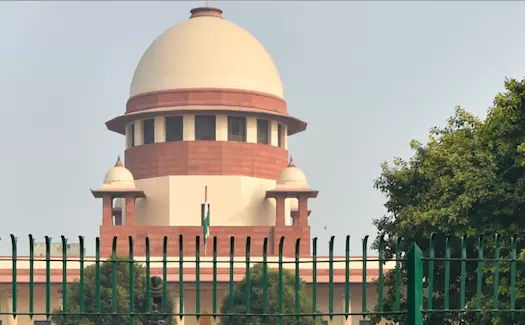SC Lays Down Guidelines on Depicting PwDs in Films

New Delhi: In a landmark ruling, the Supreme Court on Monday established comprehensive guidelines against the "disparaging" portrayal of persons with disabilities in visual media and films, emphasising that terms such as "cripple" and "spastic" have acquired devalued meanings in societal perceptions.
The verdict came in response to a plea filed by petitioner Nipun Malhotra, who argued that the Hindi film 'Aankh Micholi' contained deprecatory references to differently abled persons.
A bench headed by Chief Justice of India D.Y. Chandrachud stated, "Words cultivate institutional discrimination, and terms such as cripple and spastic have come to acquire devalued meanings in societal perceptions about persons with disabilities."
Laying down the guidelines, the bench mandated that the film certification body CBFC must seek the opinion of experts before allowing screening. The apex court stated, "Visual media should strive to depict diverse realities of persons with disabilities, showcasing not only their challenges but also their successes, talents, and contributions to society. They should neither be lampooned based on myths nor presented as super cripples."
The bench, also comprising Justices J.B. Pardiwala and Manoj Misra, emphasised that "stereotyping is an antithesis to dignity and non-discrimination." They highlighted the judiciary’s evolving role in safeguarding individual rights and addressing the complex intersections of disability, gender, and mental health.
“We must distinguish disabling humour that demeans and disparages persons with disability from disability humour, which challenges conventional wisdom about disability. While disability humor attempts to better understand and explain disability, disabling humor denigrates it," the bench said. "We take this opportunity to provide a framework for the portrayal of persons with disabilities in visual media that aligns with the anti-discrimination and dignity-affirming objectives of the Constitution as well as the rights of persons with disabilities."
The judgment underscored the detrimental impact of stereotypes on discrimination and the enjoyment of fundamental rights, referencing a landmark decision from August 24, 2017, where a nine-judge Constitution bench unanimously declared the right to privacy a fundamental right under the Constitution.
The bench also rejected a “one-size-fits-all” approach to disability, acknowledging the importance of preventing stigmatisation and discrimination, which profoundly impact the sense of identity and dignity of individuals with disabilities.
The guidelines advocate for inclusive language and representation, avoiding terms that perpetuate negative stereotypes such as “cripple” and “retard.” The bench held that "creators must strive for accurate representation of medical conditions to prevent misinformation and stereotypes."
The Supreme Court further directed that the context, intention, and overall message of a film must be considered before judging its content. Disabling humour that demeans persons with disabilities should be distinguished from humor that challenges conventional wisdom about disability.
The bench emphasised the principle of "Nothing about us without us," promoting the participation of persons with disabilities in the decision-making process regarding media content. They directed that statutory committees and expert opinions should be constituted under the Cinematograph Act and Rules to ensure that PwDs have a voice in evaluating media content.
Engaging with disability advocacy groups can provide invaluable insights and ensure accurate and respectful portrayals, the bench said, recommending that media creators undergo training and sensitisation programs to understand the impact of their work on the dignity and rights of PwDs.
Petitioner Nipun Malhotra, a disability rights activist, had complained against the movie 'Aankh Micholi', produced by Sony Pictures Films India, arguing that it contained derogatory and discriminatory remarks towards PwDs. Senior advocate Sanjoy Ghose, representing Mr. Malhotra, highlighted specific instances in the film where people with speech disabilities were called "atki hui cassettes" (stuck cassettes) and a person with memory issues was referred to as "bhulakkad baap" (forgetful father).

